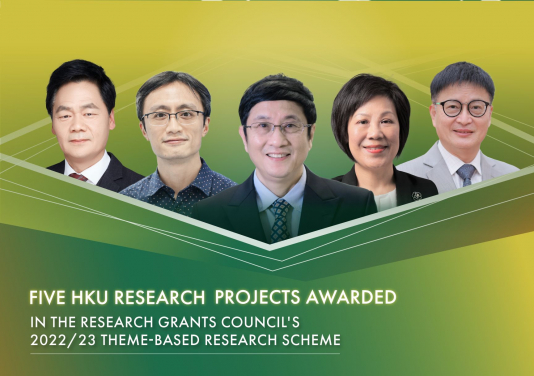Five outstanding research projects from the University of Hong Kong (HKU) were awarded a total funding of $168 million in the 12th round of the Theme-based Research Scheme (TRS), of which $149 million will be provided by the Research Grants Council and $19 million will be matched by the university.
The awarded research projects cover all four designated research themes under the TRS: Promoting Good Health, Developing a Sustainable Environment, Enhancing Hong Kong's Strategic Position as a Regional and International Business Centre, and Advancing Emerging Research and Innovations Important to Hong Kong. Here are the details of the funded projects:
"ReRACE: ReRAM AI Chips on the Edge"
Project Coordinator: Dr Ngai Wong, Department of Electrical and Electronic Engineering, Faculty of Engineering.
Awarded Funding: $32.258M
AI chips, functioning as deep-learning accelerators or processors, are essential for the development and deployment of AI technology at scale. This project takes an innovative approach on the next-generation edge AI implementation by leveraging the emerging memristive devices for in-memory computing, that could potentially boost energy efficiency by 1,000 times. The significant improvement in energy efficiency could reduce carbon footprint and facilitate the growth of ubiquitous edge AI and applications.
"SynchronHub: Cyber-Physical Internet for Synchronizing Cross-Border Logistics Hubs in the Greater Bay Area (GBA)"
Project Coordinator: Professor George Q. Huang, Department of Industrial and Systems Engineering, Faculty of Engineering
Awarded Funding: $40.301M
Cyber-Physical Internet (CPI) entangles flows of materials and information to form a logistics metaverse where sending and receiving goods is just like sending and receiving instant messages on WhatsApp or WeChat. This project proposes to develop a suite of innovative technologies for digitising logistics objects into cyber physical objects, using a configuration similar to the way of configuring a network printer. The successful construction and deployment of CPI networks globally will dramatically reduce logistics costs, improve operational efficiency and quality of services, and optimise the trade-off between economic performance indicators and environmental concerns.
"Delineating and translating the mechanistic determinants to improve the clinical management of liver cancer"
Project Coordinator: Professor Irene Oi-Lin Ng, Department of Pathology, LKS Faculty of Medicine
Awarded Funding: $43.011M
Liver cancer (Hepatocellular carcinoma, HCC) is a life-threatening illness and one of the leading causes of cancer death in Hong Kong. This project aims to improve diagnosis and treatment outcomes for patients with this deadly cancer by establishing the efficacy of immune checkpoint inhibitor (ICI) treatment. Using various cutting-edge technology platforms such as single-cell transcriptomics, the project could achieve better surgical resectability, provide insights into the genetic, molecular and immune changes in HCC patients responding to ICI treatment, as well as finding novel targets and biomarkers for ICI treatment and prognostication of HCC.
"Characterization of tumor microenvironment in nasopharyngeal carcinoma"
Project Coordinator: Professor Xin-Yuan Guan, Department of Clinical Oncology, LKS Faculty of Medicine
Awarded Funding: $9.678M
Nasopharyngeal carcinoma (NPC) is a deadly cancer commonly found in Hong Kong and other parts of Southern China. The project will apply new scientific research technologies to advance the precise treatment of nasopharyngeal carcinoma. Among them, the research aims to find the key factors that suppress the immune effect and study the possibility of it becoming a new therapeutic target. In addition, the project will develop new drugs for nasopharyngeal cancer, use bioinformatics such as artificial intelligence deep learning models to build models that predict patient response to immunotherapy, and test the joint application of immunotherapy versus chemotherapy and targeted therapy in nasopharyngeal cancer.
"Towards Carbon Neutrality: Catalysing Water and Carbon Dioxide to Green Resource Carriers"
Project Coordinator: Professor Zheng Xiao Guo, Department of Chemistry, Faculty of Science
Awarded Funding: $43.011M
Achieving carbon neutrality is a global mission. This project contributes by providing carbon negative technologies that could help reach carbon neutrality targets around the world. The developed technologies could transform earth-abundant molecules, such as (sea) water and carbon dioxide, into clean fuels and chemicals, such as hydrogen and alcohol, utilising renewable solar or wind energy during the conversion. The project also sets the scientific foundation for future research, making it possible to turn molecules in the air into fuels, fertilizers, fabrics, and even food. The research takes a multi-disciplinary approach that could make Hong Kong become a "Green Resources Carriers Hub".
The Theme-based Research Scheme, launched by the Research Grants Council (RGC) in 2010, aims to channel academic research efforts of UGC-funded universities into strategic important areas that promote the long-term development of Hong Kong.
Please click here to download photos.







